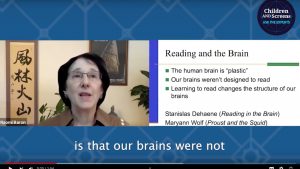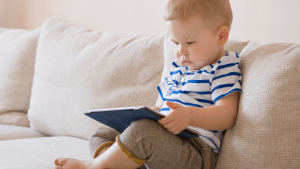
Naomi Baron, PhD (Professor Emerita of Linguistics, American University), discusses the importance of “dialogic” reading to young children, relating content to the child’s experiences through questions and conversation, from print vs digital texts for language development at #AskTheExperts webinar “Minds on Media: The Associations between Screen Engagement and Children’s Developing Brains” on November 3, 2021
[Dr. Naomi Baron] But now let’s turn to what really matters even more than the digital versus the screen versus print issue. And that is the kind of conversation that’s going between the caregiver, typically an adult, more typically parents, and the child. There’s a term used in the reading community called dialogic reading, which basically means, when you’re reading to younger kids – and that’s toddlers and that’s pre-schoolers and probably primary school kids – it’s important not just to read the words on the page, but to talk about what’s happening, to relate what’s happening to experiences that a child has. We also know that the kinds of questions that you ask, the kinds of things you say, but particularly when it’s asking questions, matter, so-called WH questions. That’s the who who, who, who, where, what, why, how, when, but particularly the why and the how questions are really important to ask about what’s happening in the book and how that relates to what else has happened in the child’s life. because the kind of answers that you’re requesting from a child are more than one word. And it’s not a yes/no, you know, “Is that a cow?” “Yes.” Well, that’s nice, but it doesn’t get you to say, “Why is the cow making noises? Why is the cow saying moo? Because…” And that stimulates more language development. This kind of dialogic reading can be done with print or digital, but so far it seems to be easier to do with print because print is a more familiar medium for us. That doesn’t mean you can’t do it, it means you have to work harder.
View the full webinar

Minds on Media: The Associations between Screen Engagement and Children’s Developing Brains
How can we use screens responsibly in order to have a positive impact on children's cognitive abilities both at home and in the classroom?
Martin Paulus, MD
Scientific Director and President, Laureate Institute for Brain Research Adjunct Professor, Department of Psychiatry, University of California, San Diego
Naomi Baron, PhD
Professor Emerita of Linguistics, American University
Jason Chein, PhD
Director, Temple University Brain Research & Imaging Center, Professor, Department of Psychology, Temple Universit
Marc Potenza, MD, PhD
Director, Division on Addictions Research at Yale, Professor of Psychiatry, Neuroscience and Child Study, Yale University School of Medicine



